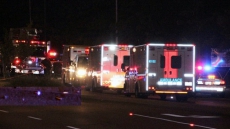TRAIL, B.C. — Seventy years after his plane went down in Belgium, a United States airman will be given a full military funeral in Trail, British Columbia, after his remains are returned to his family.
Eric Honeyman and five members of his crew aboard the Second World War bomber Hunconscious were last heard from on Dec. 23, 1944.
On Saturday, Honeyman's remains will be escorted from a DNA testing facility in Pearl Harbor, Hawaii, to the airport in Castlegar, B.C., where they will be met with a formal receiving line and ceremony.
The funeral, with a 21-gun salute and Honeyman's family attending, will be held on Monday.
"It is just wonderful," said Trail resident Marnie Matthews about the return of her cousin's remains. "All of our lives, we never knew what happened to him."
The Hunconscious, a B-26 Marauder, with Honeyman at the ready to drop one of the 450-kilogram bombs it was carrying, was a member of the 599th Bombardment Squadron in a group called the Bridge Busters.
During one of the coldest winters Belgium and France had seen, most of the planes were grounded while Adolf Hitler's armies launched an offensive later named the Battle of the Bulge.
The battle was at its turning point when Honeyman's plane and another, Bank Nite Betty, took off with the mission to destroy a vital rail bridge in Eller, Germany.
Neither plane made it back to base.
Six years ago, a hiker named Helmut Deitrichs found a small fragment of Honeyman's flying jacket in the Belgian mountains. He called his friend Danny Keay, a U.S. Army intelligence professional who searches for plane crash sites as a hobby.
Honeyman's army identification number and initials were still visible on the scrap of fabric, beginning a years-long process of excavation and identification.
"Through a Freedom of Information request, Danny got the notification that the number corresponded with Eric's service number," said Scott Honeyman, a cousin of the lost bomber, and his oldest living relative.
He said they reported the information to the U.S. Army, which scheduled a search.
History Flight, a group of veterans who also look for missing planes, started an excavation of the plane, but once they found human remains around the site, the army took over.
After a recovery operation that lasted two summers, the remains of the six crew members on the Hunconscious were identified and, where possible, returned to their families.
"My brothers and I gave DNA and a few years later they were able to match it," Scott Honeyman said from his home in Vancouver. "Once they had the expectation that they might find human remains, they hired a genealogist to track us down.
"They excavated a huge amount of space and found human remains up to 900 metres away from the impact crater. The theory is that as the plane went down, the four 1,000-pound bombs in the plane exploded, which would have scattered remains over a wide area.
"The other thing that kind of amazed me is they brought in cadaver dogs, and after 70 years, these dogs were still able to find traces of human remains."
Honeyman's plane was one of 10 that were shot down by German anti-aircraft fire during the Battle of the Bulge. At the time, there were conflicting reports as to what happened to the Hunconscious and its crew.
"The Americans spent a lot of time in the late '40s looking and interviewing people in the area to try and find the lost planes," Scott Honeyman said.
Although the lost soldier grew up in California and was a member of the U.S. Army, when the family was asked where they wanted his remains to stay, Trail seemed like the logical choice.
"We thought that since our grandparents were buried here (it would be a good place)," Matthew said. "Eric's parents, Bella and Eddy, their bodies were donated to science so there isn't a grave. There is nowhere for him to go be with his parents, so why not bring him home with his family? It is just really special and meaningful."
Members of the Honeyman family live around B.C., from Kimberley to Vancouver to Trail and will be gathering in Trail for the ceremony.
"This is such an opportunity to have a Honeyman reunion and honour one of us, who as a young man, went off and I am sure was hoping to come home," Matthew said.
In August, a funeral for the entire crew will be held at the U.S. Army's military burial grounds at Arlington National Cemetery in Virginia. Three of Honeyman's cousins will be there.




